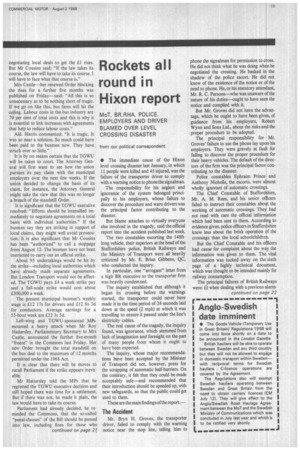Rockets all round in Hixon report
Page 17

If you've noticed an error in this article please click here to report it so we can fix it.
MoT, BR,RHA, POLICE, EMPLOYERS AND DRIVER BLAMED OVER LEVEL CROSSING DISASTER
from our political correspondent • The immediate cause of the Hixon level crossing disaster last January, in which 11 people were killed and 45 injured, was the failure of the transporter driver to comply with a warning notice to phone the signalman.
The responsibility for his neglect and ignorance of the system belonged principally to his employers, whose failure to discover the procedure and warn drivers was the principal factor contributing to the disaster.
But blame attaches to virtually everyone else involved in the tragedy, said the official report into the accident published last week.
The two constables escorting the 148ftlong vehicle, their superiors at the head of the Staffordshire police, British Railways and the Ministry of Transport were all heavily criticized by Mr. E. Brian Gibbens, QC, who conducted the inquiry.
In particular, one "arrogant" letter from a high BR executive to the transporter firm was heavily condemned.
The inquiry established that although it began its crossing before the warnings started, the transporter could never have made it in the time period of 24 seconds laid down at the speed (2 mph) at which it was travelling to ensure it passed under the line's electricity cables.
The real cause of the tragedy, the inquiry found, was ignorance, which stemmed from lack of imagination and foresight on the part of many people from whom it ought to have been expected.
The inquiry, whose major recommendations have been accepted by the Minister of Transport did not, however, press for the scrapping of automatic half-barriers. On the contrary, it felt that they could be made acceptably safe—and recommended that their introduction should be speeded up, with new safeguards, so that the public could get used to them.
These are the main findings of the report:— The Accident
Mr. Bryn H. Groves, the transporter driver, failed to comply with the warning notice near the stop line, telling him to phone the signalman for permission to cross. He did not think what he was doing wh n he negotiated the crossing. He basked i the shadow of the police escort. He did not know of the existence of the notice or the need to phone. He, or his statutory atten ant, Mr. R. C. Parsons—who was unaware f the nature of his duties—ought to have see the notice and complied with it.
But Mr. Groves did not have the a antage, which he ought to have been giv , of guidance from his employers, R bert Wynn and Sons Ltd., about the risks an the proper procedure to be adopted.
The principal responsibility for Mr. Groves' failure to use the phone lay upon his employers. They were gravely at fault for failing to discover the proper procedur for their heavy vehicles. The default of the 'rectors of the firm was the principal factor contributing to the disaster.
Police constables Ephraim Prince and Anthony Nicholls, the escorts, were al ost wholly ignorant of automatic crossing I.
The Chief Constable of Staffordshire, Mr. A. M. Rees, and his senior officers failed to instruct their constables about the working of automatic crossings. They had not read with care the official information which had been sent to them. According to evidence given, police officers in Staffor shire knew less about the brisk operation f the crossings than the local schoolchildre But the Chief Constable and his o cers had cause for complaint about the w the information was given to them. The vital information was tucked away on the sixth page of a highly technical docu ent, which was thought to be intended mai y for railway consumption.
The principal failures of British R ways were: (i) when dealing with a previous alarmcontinued on page 22




































































































